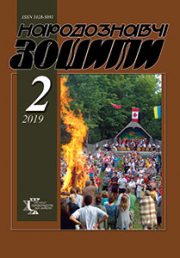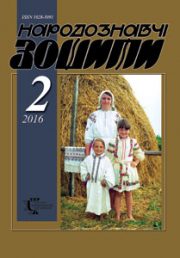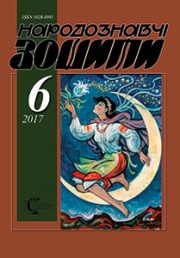The Ethnology Notebooks. 2017, 6 (138), 1446—1449
UDK 821.161.21.09″18″T.Shevchenko :7.04.035.7
DOI https://doi.org/10.15407/nz2017.06.1446
Received 31.10.2017
Semeniuk Vasyl, associate professor
at the Department of the academic painting
of the Lviv National Academy of Arts,
Kubiiovych Str., 38, Lviv, 79011, Ukraine.
Abstract: The article discusses the sociocultural prerequisites of T. Shevchenko`s poem «Dream» and said the role of the work in establishing of new vectors of creative development of the artist. In particular, significant attention paid to the definition of composite structure features of the poem «Dream», establishing reminiscences of classic and current works of world and Ukrainian literature and culture. Specificity of subjective and objective factors which were to form the basic symbols of individual motives and characteristics of structuring stories in text is analyzed. The features of ethical and aesthetic interpretation of key personnel poem «Dream» and sociopolitical dimension text of the poem and the factors that led to the emergence of these reasons are disclosed. Also it is considered semantics shaped structures of the poem «Dream» and their relationship with actual creative research of T. Shevchenko in this period. It is determined what specific consequence for the further development of T. Shevchenko’s creative strategies has been made by formed symbols and compositional approaches.
Keywords: poem, song, symbolic images, creative quest, reminiscences.
REFERENCES
Mats’ko, L. (2014). Viziia istorii Ukrainy cherez stylistychnu strukturu komedii «Son» Tarasa Shevchenka. Naukovyj chasopys NPU im. M.P. Drahomanova. Seriia 8. Filolohichni nauky (movoznavstvo i literaturoznavstvo), 5, 29—37. [in Ukrainian]
Antsybor, D. (2015). Reministsentsii onirychnoho fol’kloru v poemi «Son» Tarasa Shevchenka. Retrieved from http://molodyvcheny.in.ua/files/journal/2015/10/27.pdf
Bojtsun, I. (2014). Poema «Son» («U kozhnoho svoia dolia») ta «Eneida» Ivana Kotliarevs’koho: invarianty svitobudovy. Retrieved from http://www.visnykfilolog.uzhnu.edu.ua/uploads/articles/ 2014/628_poema_son_(u_vsyakogo_svoya_dolya)_Tarasa_Shevchenka
Kashuba, M. Satyra Tarasa Shevchenka iak vyiav romantychnoi ironii. Retrieved from http://doxa.onu.edu.ua/Doxa1/7072.pdf
Kryvda, N. Son iak semiotychne vikno. Retrieved from http://papers.univ.kiev.ua/ filosofija_politologija/articles/ The_dream_of_semiotic_window_17408.pdf
Tkachuk, O. Medial’nyj naratyv poemy «Son» Tarasa Shevchenka. Retrieved from nbuv.gov.ua/jpdf/Shs_2011_13_22.pdf
Shevchenko, T. Son. Retrieved from http://poetry.uazone.net/kobzar/son.html
Shevchenko, T. Schodennyk . Retrieved from http://litopys.org.ua/shevchenko/shev501.htm







